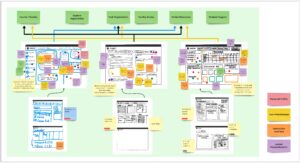Re-Imagining MyEd: My experience working as a User Research Intern
About me
My name is Nenna Nwawudu and I’m a 5th year MMath Mathematics student at the University of Edinburgh. I recently wrapped up my second semester working in the Portal Services team as a User Research Intern; it has been an amazing journey so far. I’ve had the exciting opportunity to work with and meet staff and students across the university to better understand the MyEd portal and its role in serving the Edinburgh University community.
Why is User Research important?
At the University of Edinburgh, the MyEd portal is integral to student’s academic lives. I know from both my personal and professional experience that MyEd is a crucial tool in my daily activities. That is why we need to delve deeper into how the portal currently meets students’ needs and identify areas for improvement. We aim to make the student experience as optimal as possible.
Research Methodology
During my first semester, we pursued this aim by conducting interviews to uncover students’ daily top tasks. This process enabled us to pinpoint some of the most crucial areas of MyEd for users. Subsequently, we organised a series of creative sketching workshops to explore whether MyEd meets individual needs and to envision an ideal MyEd for diverse student profiles. To date, we have carried out over 25 interviews and 3 group workshops. These sessions involved students at various academic stages, encompassing both undergraduate and graduate levels, international and domestic students and representatives from all three university colleges.
Workshop Procedure
The workshops were designed to foster creativity and collaboration. We began with our standard warm-up activity where students identified and categorised university-related tasks; this got them in the mindset of the activity. The main activity then took a multiple-step process:
- Individual sketches: “How would your ideal MyEd look?”
- Pair sketches: Create a new sketch incorporating ideas from each other’s sketches
- Final sketch: In a new group, create a final collaborative sketch.
- Review: Present your final design and vote on your favourite features
An example of the evolution of two student sketches is shown below. The initial designs, shown at the bottom were created in a quick 5-minute sketch-up. The sketches at the top are the result of a further 1 hour of development. The coloured dots are features students’ peers have recognized as important attributes of the design.

MyEd Continuing Students Creative Workshop Sketches
Insights from creative sketching workshops and interviews
We collated our sketches with our qualitative interview results. Students shared valuable insights on their university-related tasks, highlighting several positive aspects of their experiences while suggesting areas for improvement.
Layout personalization was a design theme present in all sketches. It took many different forms within two broader categories: automatic personalisation and manual content flexibility. Automatic personalisation includes features such as displaying school/department-specific news or an algorithm to display frequently visited content on the home page. Manual flexibility involves features such as re-arrangeable widgets, calendar view toggles in MyEd, and many more. When elaborating on their design rationales, students reported that the current MyEd does not accommodate individual needs for task prioritising or the large disparity in experience between students in different schools. Further, they suggest that personalising layouts would enhance their daily efficiency.
Task organization was one of the most prominent themes of discussion across all workshops. Almost all students shared that it was very important for them to:
- Receive timely information about to-do tasks such as timetables, course announcements, and assessment deadlines,
- Plan their work based on and around the information gathered,
- Keep track of the progress on completion throughout the semester.
This meant that students consistently included a task or time-management function in their ideal MyEd portal. This function would automatically gather updates, announcements and deadlines from MyEd, Learn, and Outlook, while also allowing manual input of tasks. This feature would allow students to visualise and track their to-do tasks in list or calendar views, depending on preference, this would streamline information and improve time management.
Next steps
The insights we have gained from these suggestions have provided the Portal Services team with a wealth of development opportunities. After these initial findings, we strategically developed the next steps into two distinct areas of focus. My colleague Ana researched the personalisation of MyEd and I homed in on the student experience of notifications and deadlines.
I am excited to continue my User Research Internship over the summer. My colleagues have made me feel so welcome and it feels great to be a member of the team. I am enthusiastic about our upcoming projects and looking forward to where this internship may take me.

